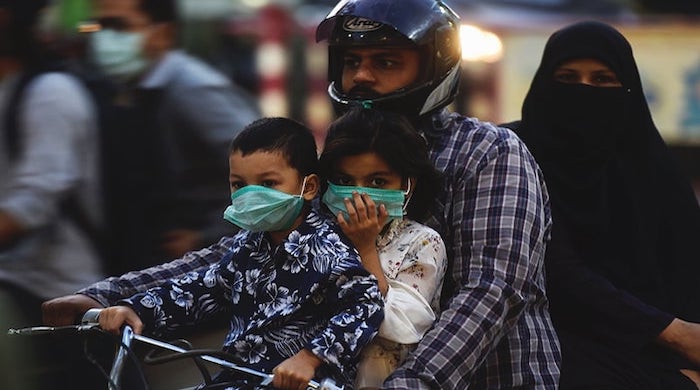Pakistan's coronavirus single-day tally sees a drops after six weeks
The country recorded 1,704 new infections in the past 24 hours, raising the national tally to 460,672
Pakistan's coronavirus positivity rate dropped to 4.93% after more than six weeks of a surge in infections, data issued by National Command and Operations Centre showed on Tuesday.
The country recorded 1,704 new infections in the past 24 hours, raising the national tally to 460,672. Government data showed 60,190 COVID-19 cases have been reported across Pakistan in the last 21 days with a daily average of 2,866.19.
The virus claimed 82 lives in a day, bringing the death toll to 9,474. At least 1,383 people have died due to the coronavirus since the start of December.
At least 2,398 COVID-19 patients are currently under critical condition out of the 40,261 active cases across the country. So far, a total of 410,937 people have recovered from the virus.
Vaccine
Federal Minister for Planning and Development and NCOC chief Asad Umar has said that the federal cabinet has approved procurement of the vaccines, which are expected to arrive sometime between January and March next year.
Pakistan has also signed up for the United Nation's COVAX Facility, a global initiative aimed at equitable access to safe and effective COVID-19 vaccines worldwide.
There are multiple local and China-made vaccine trials being conducting across the country.
Bids to contain the virus
With the rising spread of the virus, the federal government on December 9 warned it would shut down more sectors if the public continued to violate coronavirus SOPs.
Asad Umar said there was a rapid increase in infections during the second wave as the public was less serious than it was during the first wave.
He warned that if the virus is not contained, the government may decide to close down more sectors and impose stricter restrictions in two weeks' time.
Current restrictions
The federal government has already made face masks mandatory in public spaces, limited large public gatherings to 300, banned indoor weddings, closed shrines, cinemas, and theatres, and instructed public and private offices to adopt a work-from-home policy and 50% occupancy.
The federal government has also announced that educational institutes will remain closed from November 26 to January 10. The students will study at home or get weekly homework till December 24 and winter vacations will start December 25. The schools will reopen on January 11 - which is subject to coronavirus situation then. All examinations have been postponed except admission and recruitment tests.
Furthermore, all provinces have banned indoor dining and limited timings for markets, shops, and shopping malls. Many areas in the country have been placed under smart lockdowns.
-
Security forces gun down 30 terrorists in multiple IBOs in KP: ISPR
-
MQM-P calls for new province in Sindh
-
US report validates Pakistan military edge over India: PM
-
Banned TTP poses serious threat to Pakistan security: UNSC panel
-
CM Afridi clarifies remarks on by-poll after ECP requests army deployment
-
Dubai sees 3.2m Pakistani passengers in 2025 as airport sets new milestone
-
Security forces kill 23 Indian proxy terrorists in KP's Kurram
-
Pakistan to construct island to boost oil exploration: report












